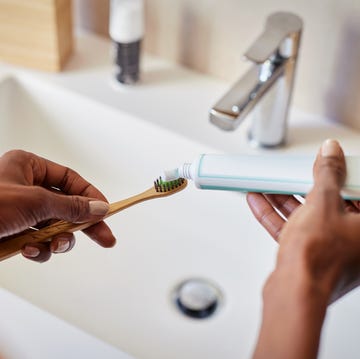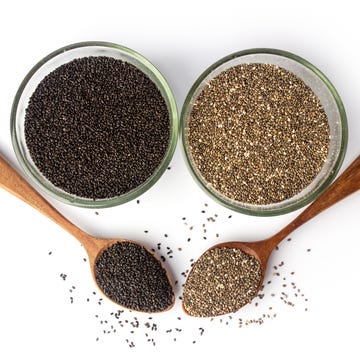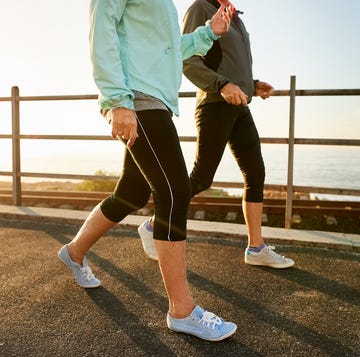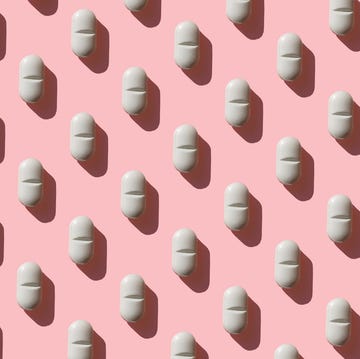Add a veggie.
It’s oh-so-easy to rely on standbys like broccoli and carrots (especially if you live with a “What is that?!” eater). But by expanding your roster, you have a better chance of eating a variety of nutrients. And you might excite your palate enough to eat even more veggies, which are linked to a lower risk of dying of heart disease. So, a few times each week, try Jerusalem artichokes, kabocha squash, dinosaur kale or something else novel to you.
Give your toes more space.
Women’s feet tend to get bigger in midlife, especially after pregnancy, says Brad Schaeffer, D.P.M., a New York City foot surgeon at Sole Podiatry NYC. He adds that most women he sees are wearing the wrong shoe size. “This can have a ripple effect on your body and affect your knees, hips and lower back,” he says. Seek out a shoe store or a podiatrist to get properly measured.
Exercise smarter, not longer.
Many people think the only way to get results is to do more and more exercise, but there are other options. Yes, any workout you’ll actually do is good exercise, but research shows that working out more intensely (rather than just spending more time exercising) can improve spatial memory, the kind that helps you recall where you left your keys. “If you have 20 minutes, go all out for one minute, rest for one minute and repeat six to 10 more times,” says Abbie E. Smith-Ryan, Ph.D., a professor of exercise physiology at the University of North Carolina, Chapel Hill.
Jack up your calcium.
As you get older, your body gets worse at absorbing this mineral, but it is key for strong bones as well as your heart, muscles, nerves and hormones. Make a point of reaching for calcium-rich foods such as dairy products (yogurt is an especially good source), leafy greens (such as collard greens and kale), tofu and sardines. And ask your doctor or dietitian if you should take a supplement, says nutritionist Dawn Jackson Blatner, R.D.N. Women need 1,000 mg of calcium daily until age 50 and 1,200 mg per day after that.
Grab a paintbrush.
Or a camera, a lump of clay or some oil pastels. Getting into a focused creative zone is a boon for both body and mind: Research has found that mindfulness-based art therapy might ease menopausal stress and offer a boost in other areas such as nutritious eating and relationship health. Plus, when you try something you haven’t done before, your brain creates new neurons and connections, and your memory is affected positively as well.
Treat your feet.
It’s time to bestow a little love on them. Data shows that reflexology, a special kind of foot massage, can help people sleep an hour longer and ease fatigue and anxiety levels. Before bed, use your thumbs to knead circles across your soles, or roll a tennis ball along the bottoms of your feet.
Mark your calendar.
This is your reminder to add that colonoscopy, that vaccination and any other important procedures, exams and screenings to your calendar. If a mammogram is on your to-do list, there’s a way to make it a little less unpleasant: Look for an imaging center that uses a system called SmartCurve. Its compression surface is curved like a woman’s breast, which may decrease underarm pinching and pain.
Find your flock.
According to British research, seeing or hearing birds was associated with a lasting boost in mental well-being. Go for a bird-watching walk or put out a bird feeder, sit at the window next to your cat and watch your worries take flight.
Ditch diet drinks.
Yes, it's time to swap them out for sparkling water. In a 14-year study of middle-aged women, those who drank more than 20 oz of diet soda a week faced twice the risk of diabetes of those who didn’t drink artificially sweetened or sugar-sweetened beverages. Chemicals in artificial sweeteners can trigger changes to the gut microbiome that harm metabolic health.
Meet for coffee.
Drinking two to three cups a day of your favorite brew (decaf is fine) can lead to a lower risk of cardiovascular disease and early death. If you like the taste, go for espresso — it boasts more antioxidants (which may help stave off dementia) than any other beverage, says Lisa Mosconi, Ph.D., director of the Women’s Brain Initiative at Weill Cornell Medicine. Just make sure you sip the caffeinated stuff early enough that you can still fall asleep at night.
Moisturize everywhere.
Vaginal moisturizers can help you avoid painful sex resulting from dry, thinning tissues, says Susan Loeb-Zeitlin, M.D., an ob/gyn at Weill Cornell Medicine and New York-Presbyterian Hospital. While lubricants are great for minimizing friction during sex, vaginal moisturizers help produce and lock in moisture just as facial moisturizers do. Pick one with hyaluronic acid — some studies found it as effective as vaginal estrogen at improving dryness.
Plan to win.
Spend 15 minutes a day imagining what life will be like when you accomplish your goals, advises Susan Krauss Whitbourne, Ph.D., professor emerita of psychological and brain sciences at the University of Massachusetts, Amherst. Over time your outlook may become sunnier — a good thing, as optimists are more likely to live to age 90 or beyond, a study shows.













